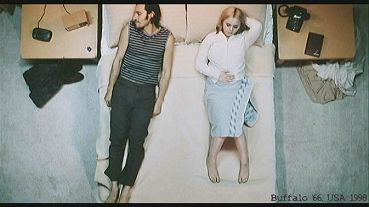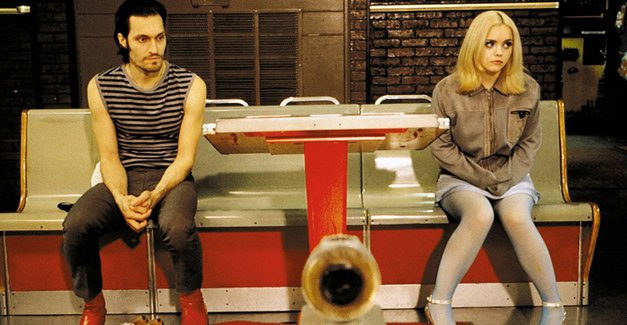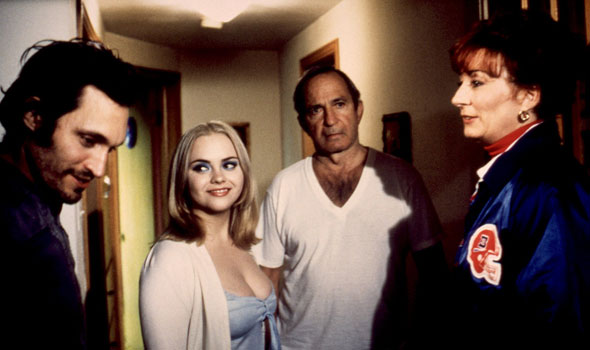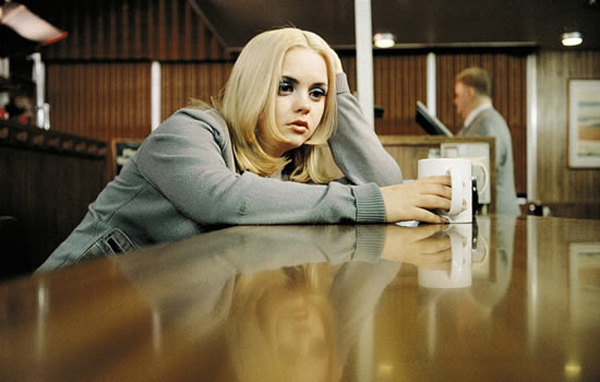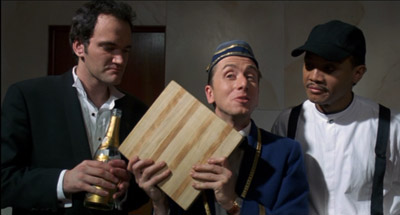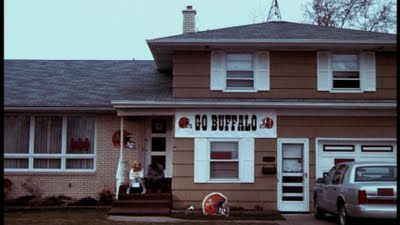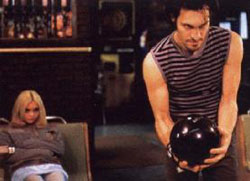From the Chicago Reader (August 7, 1998). — J.R.
Buffalo ’66
Rating * Has redeeming facet
Directed by Vincent Gallo
Written by Gallo and Alison Bagnall
With Gallo, Christina Ricci, Anjelica Huston, Ben Gazzara, Kevin Corrigan, Mickey Rourke, Roseanna Arquette, and Jan-Michael Vincent.
Vincent Gallo has proved himself a good actor in many films — in Arizona Dream, The Funeral, and several Claire Denis movies. But the first feature in which he functions as director, cowriter, composer, and star is a pathological curiosity. Candidly and painfully personal, Buffalo ’66 seems to spring from the kind of fantasies that inform movies almost exclusively — though vanity publishers offer similar opportunities. For me the film creates more embarrassment than sympathy, but at least it’s a kind of embarrassment that’s instructive. Its genre — narcissistic self-hatred reconfigured as a sense of entitlement — is far from exclusive to American movies, though it’s especially common in American independent efforts. Part of the self-hatred comes from the sense that it’s a disgrace to be poor, a sense more common in this country than in most other places, and poverty gives the film a distinctive musty odor — an ambience evident in such settings as a bowling alley and a cheap motel room.
On the face of it, the plot makes no sense. Billy Brown (Gallo) gets out of the state penitentiary after taking the rap for a crime he didn’t commit in order to pay off a $10,000 bet on the Super Bowl. Reluctantly he takes the short bus ride back to Buffalo, his hometown: he’s been deceiving his parents (Anjelica Huston and Ben Gazzara) about his whereabouts for the past five years, claiming that he’s married and has an important government job in Washington, a deceit he’s maintained by getting his only friend, a simpleton he calls Goon (Kevin Corrigan), to post his letters.
Calling from a pay phone, Billy tells his mother he’s in town but claims that his wife, “Wendy” (named after an old classmate he was obsessed with), is too sick to leave the hotel room; his mother browbeats him into saying he’ll bring her along to dinner anyway. Right after he hangs up, he kidnaps the young woman leaving a tap dance class who just “lent” him a quarter to make the call, ordering her to drive them to his parents’ house and impersonate his wife. Threatening to kill Layla (Christina Ricci) if she refuses, he insists she make him look as successful and happily married as possible.
How does she respond to this absurdly aggressive demand? She totally acquiesces, making no attempt to rebel or escape. She does set one limit, insisting that she won’t eat meat, but then when his mother winds up serving tripe, Layla wolfs it down with feigned relish; she’s equally obliging when it comes to letting his father grope her. And though Billy continues to treat her contemptuously after they leave the house, she sticks to him like glue for the remainder of the day and even proposes that they check into a motel. (Meanwhile he nurses fantasies of killing the former football player who made him lose the $10,000.) The obverse of her “perfect” behavior is the parents’ grotesque monstrosity: the mother is too preoccupied with a football game to listen to Layla’s carefully crafted account of how she and Billy met, and the father periodically explodes in violent, unmotivated rage.
This is a story that defies belief at every turn; none of the characters makes a lick of sense. But since our culture has different standards for reality in movies even when they’re supposedly about real life, Layla’s unbounded, redemptive love for this shitface — predicated on her knowing he’s a softie despite his boorish, hostile behavior — can be offered as an unproblematic given. The same principle applies to the hysterical behavior of Billy’s parents, who are flogged well past the point of credibility.
Indeed, taken for the fantasy it actually is rather than the semibelievable story it pretends to be, Buffalo ’66 starts to make a modicum of sense. Gallo is a guy who grew up in Buffalo hating his parents and himself, who eventually made it big as an actor and returned home to settle some scores — by making a movie about himself and his parents and hiring Ricci to play a woman who plays his wife. And it’s as a statement about a sense of entitlement in movies, not about reality, that Buffalo ’66 becomes interesting.
That sense of entitlement even starts to seem halfway rational once you realize that male movie fans are virtually conditioned by this culture to spin such absurd fantasies — that you can kick your girlfriend in the teeth and still be given unending, boundless affection in return. Male brutality turning into male sweetness once the redemptive love kicks in is part of the package; you might even say the brutality is justifiable because it makes the love possible. If Billy hadn’t kidnapped Layla, she probably wouldn’t have given him the time of day.
It’s no accident that Ricci is the only actor who gives a good performance; part of the reason for this, I suspect, is that her part is a movie archetype, unencumbered by any need to suggest reality. Apart from the fact that she tap-dances, Layla is accorded no life or reality of her own, past or present, independent of her functions for Billy Brown. Gallo, recognizing this fact, includes a single scene, set in a dim bowling alley, in which he literally spotlights her tap dancing, apropos of nothing; the result has a certain glow and authenticity the rest of the movie lacks.
It isn’t the fault of Gazzara, Huston, and Corrigan — gifted actors all — that they deliver such terrible performances: they have no choice given the lines and scenes they have to work with. You might have sympathy for Gallo as well, if you could forget that he’s responsible for his own lines. His decision to connect every stylistic choice to Billy’s confused and pinched consciousness has a certain boldness. But that’s about its only virtue, because none of the jazzy, eclectic visual effects — the use of reversal film stock, the overhead camera angles, the gratuitous fade-ins and fade-outs, the boxed-in flashbacks, a baroque fantasy interlude with taffylike blood clots — are allowed to work in tandem with one another. Style becomes merely a fluctuating form of decoration set alongside the narcissistic portrait of an irascible lug who can’t bear to be touched because he’s so sensitive, a portrait that’s the one element the movie can’t bring itself to deviate from.
Like Quentin Tarantino’s episode in Four Rooms, this movie seems contrived to show just how obnoxiously someone can behave and still expect to be loved in return (though in fairness to Tarantino, at least he had the wit to play a media hotshot — that is, someone licensed by the culture to be obnoxious, so that the story has a chance of being perceived as satire). Gallo plays a full-fledged numbskull loser who abuses everyone in sight and counts on being indulged by all of them; given how terrible his parents are, we’re expected to conclude that he’s not to be blamed for his bad behavior. The fact that some reviewers seem to go along with his curious presumption is what makes this movie interesting, suggesting a fantasy investment considerably stronger than any realistic detail used to rationalize that fantasy.
Clearly the relationship between small-town desperation and big-time showbiz fantasy has something to do with that investment. Which makes The King of Comedy a natural point of comparison. (Buffalo isn’t really a small town, of course, but as soon as it’s placed alongside Gallo’s big-time showbiz fantasy it seems like one — just as Rupert Pupkin’s basement in The King of Comedy comes across as a small-town location despite its proximity to Manhattan.) The setting and family life in Buffalo ’66 are uncomfortably close to Gallo’s own past. According to the press book, not only did he base the Brown residence on the last house he occupied in Buffalo with his parents, he also has Gazzara lip-synch a recording his own father once made, to the accompaniment of a “music minus one” record of Nelson Riddle arrangements — an early, homespun form of karaoke, the pop-music variation on small-town fantasies of hitting the big time. (Like father, like son.)
The same press notes report that Gallo’s original script was about a man trying to become a movie star to impress his parents (an idea Gallo dropped after playing a similar role in Emir Kusturica’s Arizona Dream). But the remaining thematic parallels to The King of Comedy are striking — self-hatred, hatred of parents, kidnapping, a long-term obsession with the same woman. In effect, Buffalo ’66 functions as another “music minus one” record in which Ricci fills in for Nelson Riddle. Paradoxically, Gallo plays the melody instrument missing in every such recording, inviting every petulant male viewer to fill his role. Based on the clinical evidence of Buffalo ’66, one might even argue that one major reason for American independent filmmaking is the desire to indulge such fantasies at length.


